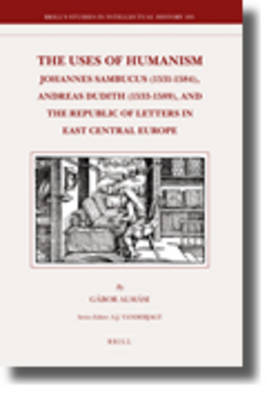
The Uses of Humanism
Brill (Verlag)
978-90-04-18185-4 (ISBN)
This book is a novel attempt to understand humanism as a socially meaningful cultural idiom in Late Renaissance East Central Europe. Through an exploration of geographical regions that are relatively little known to an English reading public, it argues that late sixteenth-century East Central Europe was culturally thriving and intellectually open in the period between Copernicus and Galileo. Humanism was a dominant cluster of shared intellectual practices and cultural values that brought a number of concrete benefits both to the social-climber intellectual and to the social elite. Two exemplary case studies illustrate this thesis in substantive detail, and highlight the ambivalences and difficulties court humanists routinely faced. The protagonists Johannes Sambucus and Andreas Dudith, both born in the Kingdom of Hungary, were two of the major humanists of the Habsburg court, central figures in cosmopolitan networks of men learning and characteristic representatives of an Erasmian spirit that was struggling for survival in the face of confessionalisation. Through an analysis of their careers at court and a presentation of their self-fashioning as savants and courtiers, the book explores the social and political significance of their humanist learning and intellectual strategies.
Gábor Almási, Ph.D. (2005) in history, Central European University, Budapest. He is a Magyary Zoltán postdoctoral fellow at the Eötvös Loránd University. He has published extensively on Renaissance humanism and early modern patriotism.
List of illustrations
Abbreviations
Acknowledgements
Preface
Introduction: On the uses of humanism
PART I: HUMANIST LEARNING AND NETWORKS IN EAST CENTRAL EUROPE
1. Aspects of East Central European humanist learning
2. Humanist networks and the ethos of the Republic of Letters
3. The uses of humanism at the imperial court
PART II: THE CASE OF JOHANNES SAMBUCUS
4. An ornament to the imperial court?
5. The multiple identities of the humanist: “vates, medicus bonus, historicusque”
PART III: THE CASE OF ANDREAS DUDITH
6. The curious career of a heterodox humanist
7. The making of the humanist: self-fashioning through letters and treatises
Epilogue: Sambucus and Dudith encounter confessionalisation
Conclusion
Bibliography
Index
| Erscheint lt. Verlag | 13.11.2009 |
|---|---|
| Reihe/Serie | Brill's Studies in Intellectual History ; 185 |
| Zusatzinfo | 9 Illustrations, black and white |
| Verlagsort | Leiden |
| Sprache | englisch |
| Maße | 155 x 235 mm |
| Gewicht | 753 g |
| Themenwelt | Geisteswissenschaften ► Geschichte ► Regional- / Ländergeschichte |
| Geisteswissenschaften ► Philosophie ► Geschichte der Philosophie | |
| Geisteswissenschaften ► Philosophie ► Philosophie des Mittelalters | |
| Sozialwissenschaften | |
| ISBN-10 | 90-04-18185-7 / 9004181857 |
| ISBN-13 | 978-90-04-18185-4 / 9789004181854 |
| Zustand | Neuware |
| Haben Sie eine Frage zum Produkt? |
aus dem Bereich


